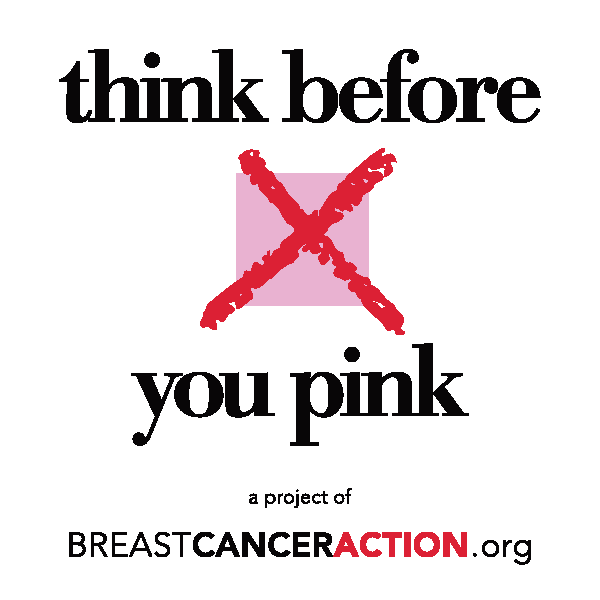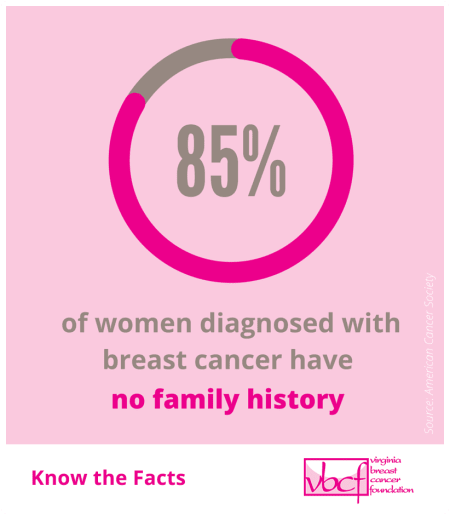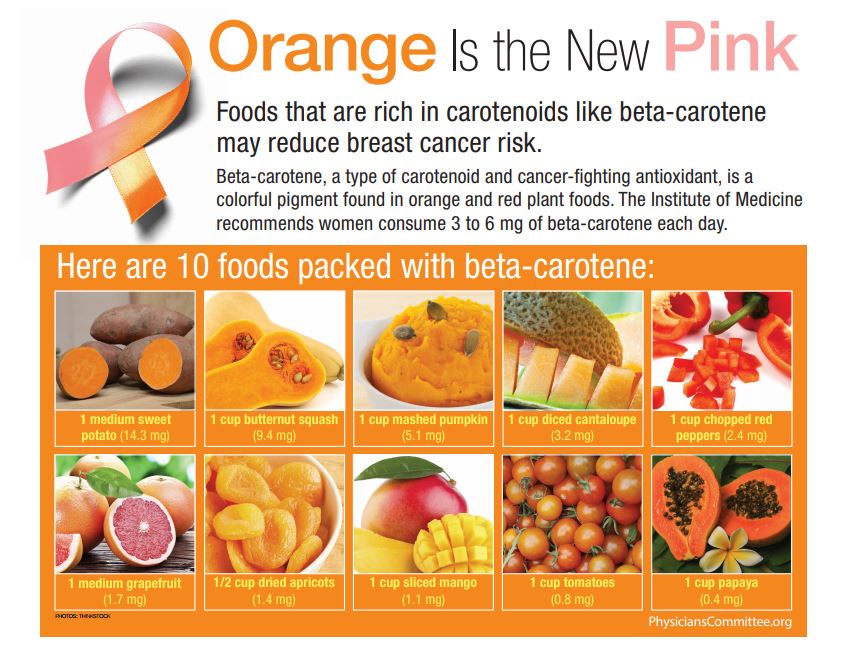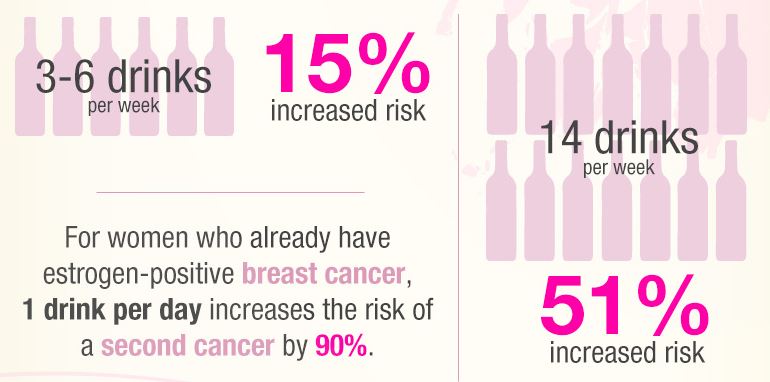October is Breast Cancer Awareness month. You’ll see pink ribbons smacked on just about any product – from fried chicken buckets to sugar-laden candy to dairy yogurt – to increase sales. It’s appalling, rarely helpful, and often harmful. A wonderful organization that helps you see through the pinkwash marketing is Think Before You Pink.

About 1 in eight U.S. women (about 12%) will develop invasive breast cancer over the course of her lifetime. In 2019, an estimated 268,600 new cases of invasive breast cancer are expected to be diagnosed in women in the U.S., along with 62,930 new cases of non-invasive (in situ) breast cancer. About 2,670 new cases of invasive breast cancer are expected to be diagnosed in men in 2019. A man’s lifetime risk of breast cancer is about 1 in 883.
For women in the U.S., breast cancer death rates are higher than those for any other cancer, besides lung cancer. About 5-10% of breast cancers can be linked to gene mutations inherited from one’s mother or father. Mutations in the BRCA1 and BRCA2 genes are the most common. On average, women with a BRCA1 mutation have up to a 72% lifetime risk of developing breast cancer. For women with a BRCA2 mutation, the risk is 69%.
About 85% of breast cancers occur in women who have no family history of breast cancer. (source)

What can you do to avoid becoming a breast cancer statistic? The Physicians Committee for Responsible Medicine (PCRM) has identified four lifestyle choices to reduce your chances of developing breast cancer.
1. Choose Plant-Based Foods because they help establish and maintain a healthy body weight, they are high in fiber to cleanse the body of toxic matter, are vitamin, mineral, and nutrient-dense, and contain protective phytochemicals like antioxidants.
Click: How to Get Started on a Whole Food, Plant-Based Diet & Lifestyle
Several foods in particular have been indicated positively for the prevention and reversal of breast cancer: orange plant foods and green tea. In laboratory and animal studies, EGCG (Epigallocatechin-3-gallate) in green tea has been shown to limit the growth of breast cancer cells and other types of cancer cells. One study of Asian-American women found that those who drank more green tea were less likely to develop breast cancer. (source) Personally I love to drink my green tea as matcha. I drink it almost every day.

2. Exercise Regularly which oxygenates your blood and cells, increases circulation, strengthens the immune system, and helps manage stress, anxiety, and depression.
3. Limit or Eliminate Alcohol because the less you drink, the lower your risk of breast cancer. (While you’re at it, don’t smoke. The only cancer causing more deaths of women than breast cancer is lung cancer.) Use the Alcohol Risk Analyzer calculator HERE that measures your lifetime breast cancer risk based on daily or weekly alcohol consumption.
Click: How to Drink Sensibly or Not At All
Click: Alcohol is Junk Food
Click: Soberistas – Giving Up Alcohol & Living Life in Control
Click: Hello Sunday Morning – A Better Drinking Culture
Click: One Year No Beer
Alcohol increases the risk of breast cancer because more estrogen circulating in the bloodstream increases breast cancer risk. Alcohol and estrogen are both processed in the liver. If alcohol is being metabolized in the liver, it means estrogen spends more time in the bloodstream.
Alcohol also increases the risk for other cancers including in the mouth and oral cavity, pharynx, larynx, stomach, colon, rectum, liver, and ovaries.
Additionally, fiber not only helps achieve and maintain optimal body weight but it also draws excess estrogen concentrations out of the body. Make sure you are consuming high fiber foods, coincidentally found only in the plant kingdom, according to the guidelines HERE.

4. Maintain a Healthy Weight by eating a wholesome plant-based diet and exercising. This will also help you stave off diabetes type 2, heart disease, high blood pressure, other cancers, and additional chronic illnesses caused by obesity. Use the free BMI Calculator HERE to determine your foundational risk based on body mass alone.
If you would like to learn more, take the PCRM pledge, and receive a free whole food, plant-based e-cookbook, you can click HERE. Here is a handy Fact Sheet to read and share. PCRM has a podcast called The Exam Room which recently interviewed Dr. Kristi Funk, founder of the Pink Lotus Center and author of Breasts, The Owner’s Manual. You can listen HERE and register for Dr. Funk’s Cancer Kicking Summit HERE.
As if that’s not enough to educate yourself and inspire you to do everything you can to reduce your risk of breast cancer, Dr. Pam Popper, founder of Wellness Forum Health, has partnered with PCRM to promote their pledge and raise funds to support their research and outreach.
Those who sign the PCRM pledge through Wellness Forum Health will receive a $100 coupon good toward one of their online educational programs, and also have access to a free lecture on breast health. Dr. Popper will be donating $25 to PCRM and the wonderful work this organization does for every coupon redeemed by November 15, 2019.
If you would like to help by asking women to sign the pledge, please send an email to pampopper [at] msn [dot] com and she will send you a packet of pledge cards to share.
Let’s swing back to the issue of estrogen and alcohol because I heard many of you screaming “what about soy?” when reading that section. Soy contains plant estrogen-like compounds called phyto-estrogens. They are mild and have shown to be protective against breast cancer.
Evidence to date indicates that soy products may reduce the risk of breast cancer and breast cancer recurrence. The benefits of soy products appear to relate to traditional soy products, not to concentrated soy proteins. (source)
Do you know what has more phyto-estrogens than soy? Beer. Yes, beer. And do you know what has more estrogen than a plant? An animal. Yes, like a cow and more specifically a pregnant cow. She has actual mammalian estrogens that your body can identify when consuming milk and milk products. Anyone wishing to minimize excess estrogen in their body would be best advised to avoid milk and other products like meat and eggs that come out of and from the bodies of animals who have their own hormones.
Click: The Dangers of Dairy
Click: Milk Just Got Worse
And lastly, what about mammograms? I still haven’t had one. It’s been 6 years since I wrote the blog post below so now I’m 10 years late for my first mammogram. I shared my mammogram concerns and reluctance with my health care provider at the Barnard Medical Center this summer. She wasn’t too concerned especially considering my plant-based diet, regular exercise, and avoidance of alcohol and cigarettes.
Click: Why I’m 4 Years Late for My First Mammogram
Dr. Pam Popper has a few words to share about mammograms.
Educate yourself and make the best choices for your health. Your breasts are yours and yours alone. Trust yourself and make healthful, wholesome lifestyle choices for your whole body. You have the power and right to reclaim and manage your excellent health. The large majority (85%!) of breast cancer cases are not genetic, they are lifestyle induced. Love yourself enough to live a healthy lifestyle. You and your choices are more powerful than you are lead to believe.
One more thing before I go, if you eat and live well to keep your breast healthy, chances are high your whole body – from brain to heart to gut to reproductive organs – will be healthy too. One way of eating and living takes care of them all! Now that’s the kind of multitasking we can all get behind!

{ 3 comments… read them below or add one }
Great, informative article, Carla! It should get wide distribution.
Thank you so much Karen. It’s so sad to see so many women suffer needlessly.
Thanks for telling me that having a plant-based diet can help me avoid breast cancer. I’ve watched a Youtube video about this disease and although some people were able to survive after treatment, some people didn’t still get lucky. I don’t want to belong to the latter category, so I’ll be sure to look after my own health.